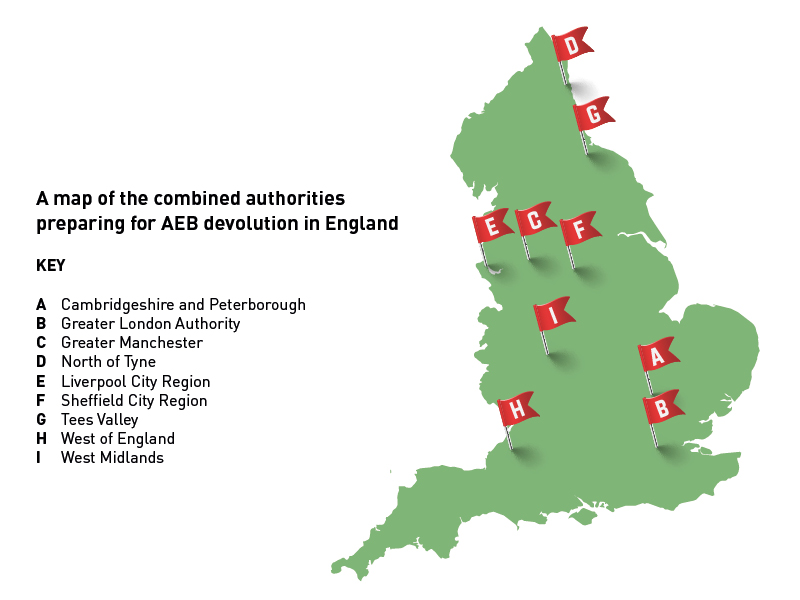The mayor of London plans to top-slice £3 million from the adult education budget to pay for over 50 new bureaucrats from next year, instead of using it for frontline learning.
The money will cover the annual wage costs of a new administration to handle the AEB for the capital when devolution kicks in, including a £140,000-a-year assistant director.
The 53-strong team will form a skills and employment unit to dish out the budget from 2019/20, which will amount to around £311 million per year for London.
However, many of the tasks this unit will carry out will simply duplicate the work that the Education and Skills Funding Agency already does.
The GLA told FE Week that the ESFA has refused to give a “service offer”, which includes procurement, audit, contract management, direct access to data and changes to the Individual learner record systems.
These costs will be top-sliced from the devolved annual budget
London’s Mayor, Sadiq Khan (pictured above), is asking the ESFA to reconsider, according to the GLA.
The Department for Education has been asked for comment.
Using AEB funding to pay for extra officials instead of learning will concern many in the sector.
However, a spokesperson for Mr Khan pointed out that “staff costs associated with this are less than one per cent of the budget being devolved to the mayor”.
The GLA is one of eight mayoral combined authorities with deals to take control of AEB spending in their regions from 2019/20.
In a document entitled ‘Proposed changes to the GLA establishment’ and released in March, the GLA explains how it will top-slice the AEB.
“The total annual gross cost of the creations is £3.245 million, for which £3.028 million is attributable to AEB and the balance of £0.217 million relating specifically to the core skills team,” it says.
“Going forward from 2019-20, once the programme has been devolved, these costs will be top-sliced from the devolved annual budget of circa £400 million per year.”
Among the staff will be one assistant director, whose annual pay packet will be £139,000. Four senior managers will be paid around £87,000 a year , while one other will be a senior project manager on £73,000.
The unit will also employ 16 principal policy officers, who will take home around £66,000 each, as well as 12 other principal project officers earning £61,000.
Ten officials will be senior policy and project officers with annual pay packets of £54,000, and eight people will hold support officer roles, paid £40,000.

The last person on the team will be an assistant administrator, who will earn £37,000 a year.
The GLA told FE Week this team will be focussed on implementing the mayor’s skills strategy, which includes a “digital talent programme” to find and develop the next generation of home-grown tech talent, and developing the mayor’s construction academy so Londoners can access jobs in the construction industry.
“The Mayor is determined that all Londoners have the opportunity to fulfil their potential and are able to enjoy the capital’s economic prosperity,” a spokesperson said.
Devolution for the AEB has been on the cards for many years but plans have not gone smoothly.
The mayors from the eight regions with deals in place recently voiced concerns with the government over the impracticality of the process.
The seven other areas of the country to have devolution deals in place are the West Midlands, Liverpool City region, Greater Manchester, the West of England, Tees Valley, Cambridgeshire and Peterborough and the Sheffield City region.









And so the disaster begins to unfold. Anybody with an ounce of sense could see this coming. Devolution = 350 AEB managers popping up around the country when 20 were doing the job perfectly adequately at the ESFA. And that 350 is just in the devolved regions! Learners shafted by self-indulgent local bureaucrats yet again.
Just goes to show that skills devolution will herald a new level of unnecessary bureaucracy, complication and confusion especially for providers delivering across the country (and probably no consistency in the procurement approaches taken by the different combined authorities).
Lets be honest, learners got shafted by ESFA when the last funding methodology was conceived;
a. higher funding rates to L2/3 to sweeten the pill for providers when Loans came in, to shift debt burden to the learner & causing drops in lower level participation.
b. the drive towards unnecessary accreditation, increasing awarding body profits
c. taking planned hours out of aim record…
d. big expansion in non value added subcontracting
e. area reviews / mergers – widespread eye watering pay awards for leadership. Half an eye on redundancy payouts?
The deep cutting of SFA means they rely on very rigid prescribed rules, stifling innovation and creating a bland offer.
Devolution may well turn out to waste money, but the current way of working doesn’t appear to be delivering.
We will never know the true value of subcontracted activity for the current and previous years as the Agency only reports aggregated contract values in excess of £100k At provider level this may well mean small amounts of activity that fall under the reporting threshold but the question is what’s the overall value for all providers combined for all subcontracted delivery?
I don’t have an issue with high quality subcontracted provision and I especially understand that some providers don’t want to tender for contracts in their own right (the admin costs involved are a massive deterrent – just think about it – the cost of employing an MIS member of staff to do compliance and funding returns outweighs the margin in the business and then even less money going to front line delivery).
And don’t get me started on level 1 programmes for unemployed people – need the most help we can provide but funded at pitiful rates especially on short courses which JCP often require.